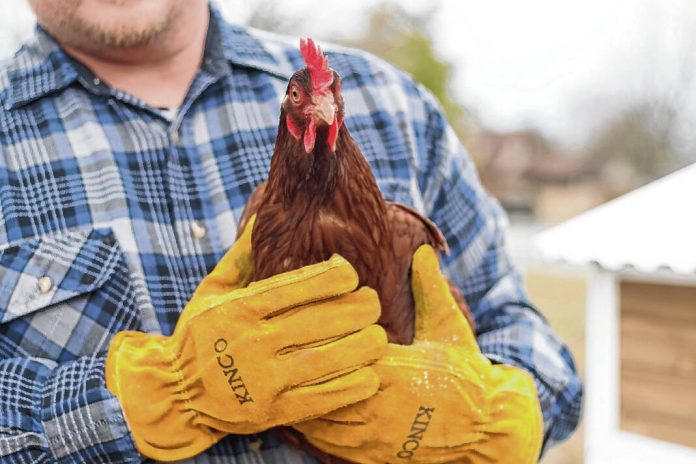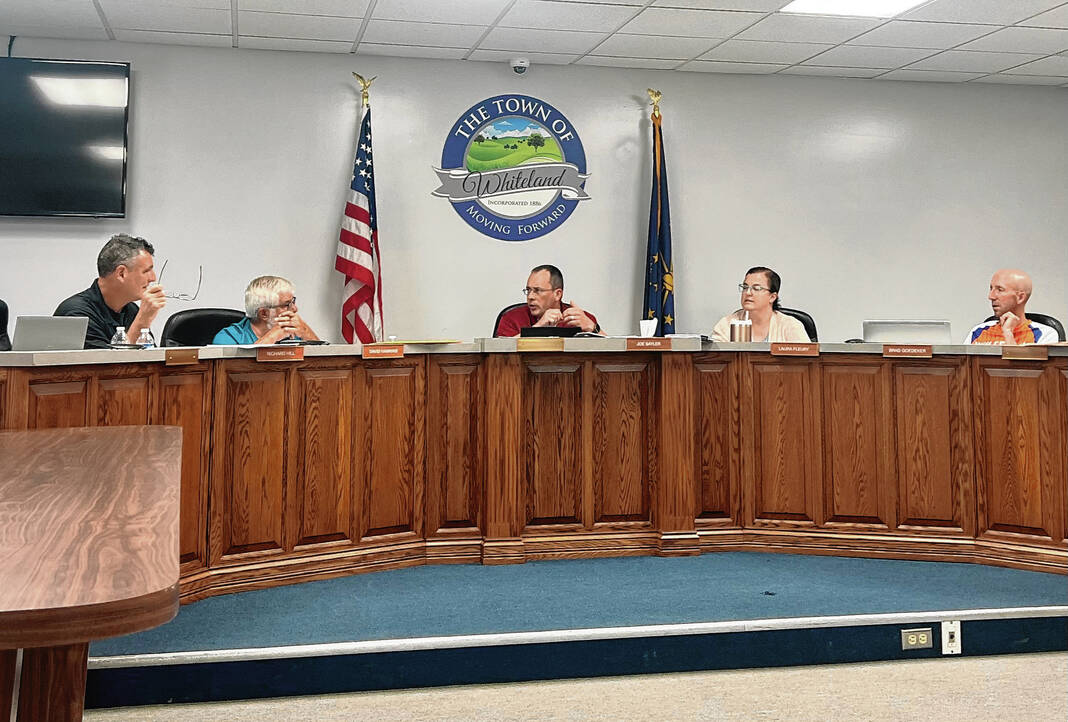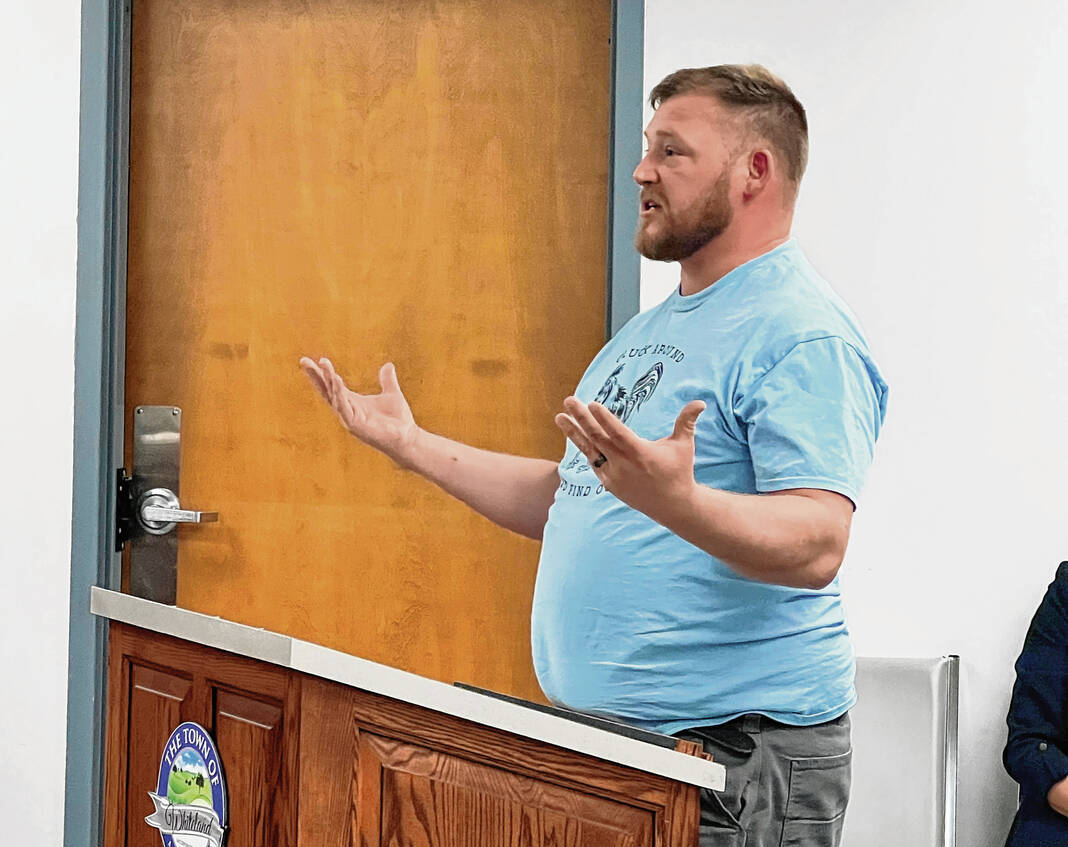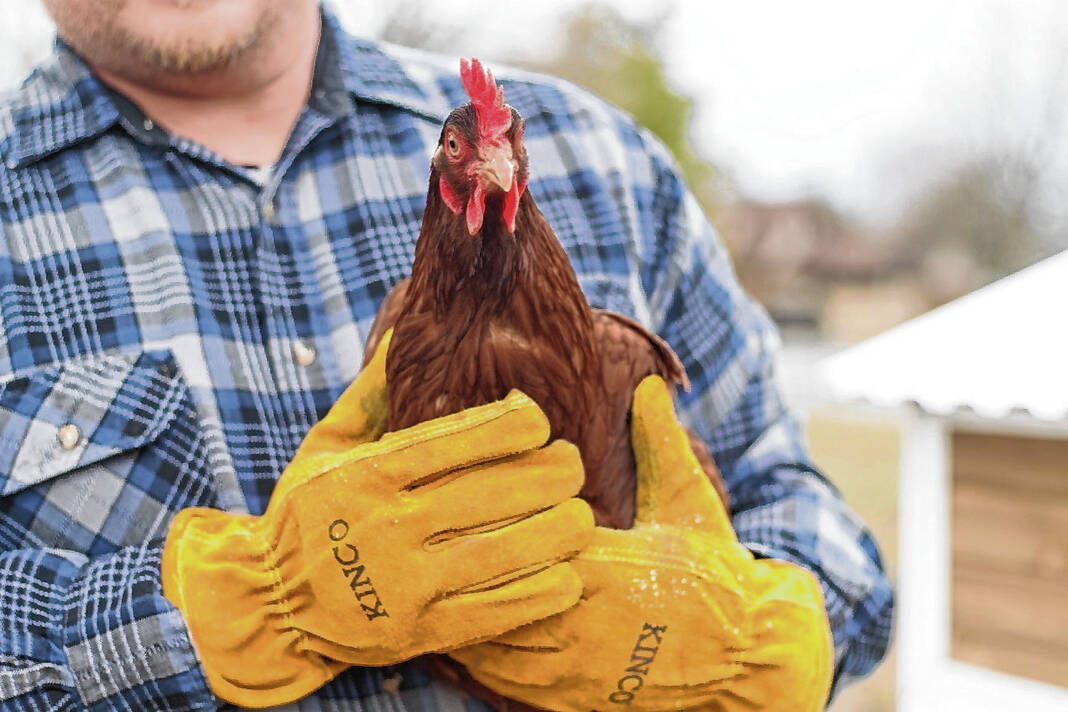A first vote from the Whiteland Town Council nudged the controversial backyard chickens ordinance forward.
Council members voted unanimously Tuesday on a first reading to amend and move forward the proposed ordinance to allow residents to keep backyard chickens. This vote is the first of many, and it passed with all members voting in favor on the condition that several amendments be made for the July meeting.
This ordinance to amend the town code to allow backyard chickens on residential lots came to the town council from the planning commission in May, who voted 4-0 to send an unfavorable recommendation to the council.
The chicken debate stems from a plea from resident Shawn Butler to allow him to keep his chickens. After owning them for a year, he was notified by the town in January that he is not allowed to have chickens.
Whiteland considers owning a small poultry flock a “nuisance” if it is within 200 feet or less from another person’s house, according to town code. There is also a provision in the code that does not allow more than three pets per household. The proposed ordinance would amend both of those codes by adding a line to each that states, “excluding Backyard Chickens permitted under a Backyard Chickens Permit.”
Ultimately, the planning commission was not satisfied in May with the first draft of an ordinance to change the town code. One main reason they were against the code change was because it is in response to a resident breaking the law. Butler has not been cited for violating town code in the last five months while officials worked on the proposed chicken ordinance.
At the town council, members on Tuesday said they were also not in favor of the initial draft and asked for several amendments to be adopted. Instead of voting to accept the planning commission’s unfavorable recommendation, they instead decided to work on the ordinance more with the goal of eventually sending it back to the commission.
Actions on Tuesday included adopting an already red-lined version that makes a few changes to the original. Members also instructed the town attorney to add in other new lines from a staff report Carmen Young, the town director of administration, drafted adding more suggestions for amendment. This report was sent to the planning commission, but was not adopted then because the board voted for an unfavorable recommendation.
What’s in the draft
The proposed ordinance would generally amend town code to allow residents to keep a small flock of hens on residential lots, with certain restrictions and a permit approval process.
The most recent version of the ordinance draft upholds everything from the original one drafted in April, with a few additions to add more meat to the code.
Residents could keep up to six adult hens on a single-family or two-family residential lot. A first draft included that up to 12 hens could be kept on a certain size lot, but that was removed. Roosters would not be permitted, the draft says.
Chickens would have to be kept in a coop that is within a fully fenced yard. Coops could not be larger than 120 square feet in area and 10 feet high, with a minimum of six square feet of run space per animal, the draft says.
Waste would have to be removed on a regular basis and the smell of the waste should not reach beyond the property line. A new addition clarifies that any waste or animal byproducts must be properly disposed of in accordance with the rules and regulations of the Indiana Board of Animal Health. Additionally, the waste or anything contaminated by the waste or chicken carcasses cannot be disposed of through Whiteland’s municipal trash services.
The new version of the ordinance draft also prohibits any slaughtering of chickens on a resident’s property.
A permit would be required to own chickens, which could be acquired through the Whiteland Board of Zoning Appeals.
Much like the process to build another accessory structure, residents would need to show town officials what the enclosure will look like and where on the property it will go, the draft says. The proposed structure would be subject to an in-person inspection, the new draft says.
Applicants would be required to follow the legal procedure for a public hearing, including notifying adjoining property owners within “two property depths” or within 660 feet of the property. Those neighbors would be allowed to submit written objections or appear at the BZA hearing to speak on the chicken permit.
A new requirement added to this draft would require applicants to also complete the Indiana Premises Identification Registration through the Indiana Board of Animal Health and submit proof of registration to the town.
The permit could be revoked if the holder does not comply with the ordinance conditions or refuses to allow town officials to inspect their property. The revocation can be appealed and a permit could be reinstated if conditions are met, the draft says.
Anyone in violation of their permit or the backyard chickens ordinance would be subject to fines from the town. Fines start at no less than $100 for the first offense, $250 for the second offense, and $500 for each offense thereafter.
Disagreements over how to make changes
Council members again argued over what changes need to be made, and how they should make those changes. Debate went on for about 30 minutes as council members decided what they wanted to do.
Butler had originally asked the Whiteland Town Council in February about changing the ordinance, and three out of five members said they would be in favor of it. Two members, Richard Hill and David Hawkins, have been opposed to allowing chickens from the start.
Hill and Hawkins took issue again on Tuesday with the fact that no changes were added from Young’s staff report with suggestions for amendments. Hill noted he’d like to see one change added to create regular inspections of permitted properties with chickens, and potentially involve a third party to conduct inspections.
“There’s a couple of things in here I assumed were going to make it into this version that we got on Monday, and that’s not there,” Hill said.
Council members also generally argued over how they should adopt the most recent red-lined version of the document, and how they would need to send it back to the planning commission. All members agreed changes need to be made but there was disagreement on how to make those.
Council president Joe Sayler said he would entertain any motion to make an amendment to the ordinance. He added he had some frustrations because certain council members wanted to hold off on considering the chicken ordinance in May for these same concerns, and no one was prepared to make changes a month later at this meeting.
Hill was primarily suggesting the changes to be made, but he said he would not make a motion to amend the ordinance. He said the three council members in favor of allowing backyard chickens should make the changes because these were issues they should care about.
Hill would not say if he would be a flat out “no” on a final vote.
“I don’t think I’ve wavered from where I stand … but I do think there some important things that Carmen (Young) had mentioned,” Hill said. “… That doesn’t mean I’m a yes or no going forward. I’m saying these are valid points.”
Sayler then asked Hill why the rest of the council should care about his concessions if he was going to vote against the ordinance anyway.
“Even if you get everything you want, if you’re still not going to support the ordinance, why would the remainder of the council be particularly concerned?” Sayler said. “You want a whole bunch of concessions … but in return, you still say no?”
Hawkins chimed in, saying in the end, it does not matter who votes for or against the ordinance. These concessions being asked for are what is best for the town, he said. Hill and Hawkins want the best version of the ordinance, even if they are against voting for backyard chickens in general.
“I’m against it, and I’ll stay against it,” Hawkins said. “I don’t think it makes a difference. We get all these concessions in there, it protects the town … it doesn’t make any difference who fought for it or against it.”
Council member Laura Fleury made the motion, in the end, to amend and pass the chicken ordinance on first reading. Hill and Hawkins did vote in favor of moving the ordinance forward on the condition those changes from the staff report be made.
Sayler also said at one point in the meeting he had concerns with the merits of the planning commission’s initial decision for an unfavorable recommendation. By statute, the commission has to take into consideration the town’s comprehensive plan, residential structures, the most desirable land use, conservation of property values and “responsible development and growth.”
Sayler said he did not think the commission voted down the chickens proposal for any of those reasons. Instead said their main reasoning for the vote was because they did not like a law being created in reaction to Butler breaking the law.
“‘I’m angry at Mr. Butler’ is not one of the terms that they are required to consider and are supposed to consider,” Sayler said.
Hill said he disagreed with that notion because he was at the May planning commission meeting, and there were other concerns about restrictions brought up besides that.
What’s next
Council members will return in July for a second vote on the ordinance, which will then send an amended draft back to the planning commission.
The planning commission can then reconsider the chicken ordinance as early as August, and send it back to the council that same month. The commission can again either issue a favorable or unfavorable recommendation.
The council will then have to vote on the ordinance twice again over the next two months. September would be the earliest a final vote could take place.
Butler was also at the meeting on Tuesday, sporting a shirt with a chicken on it that read “cluck around and find out.” He pleaded his case to the council again at the end of the meeting and said many of the rules they are considering are “overkill.”
Butler said he should not need to ask the town for permission or a permit to provide for his family.
“I’m not harming anyone. I’m not hurting anyone. No one’s complaining,” Butler said. “… You shouldn’t have any say on what kind of dog I have in my backyard. You shouldn’t have say on what kind of crops I grow. You shouldn’t have any say on what color I paint my house. What’s the difference with chickens?”
He added the concerns about chickens spreading diseases are largely false, saying there’s a bigger chance to be “hit by a semi truck on a country road on roller skates than getting salmonella.” He invited all of the council members to visit his house to see his chickens and coop setup.








